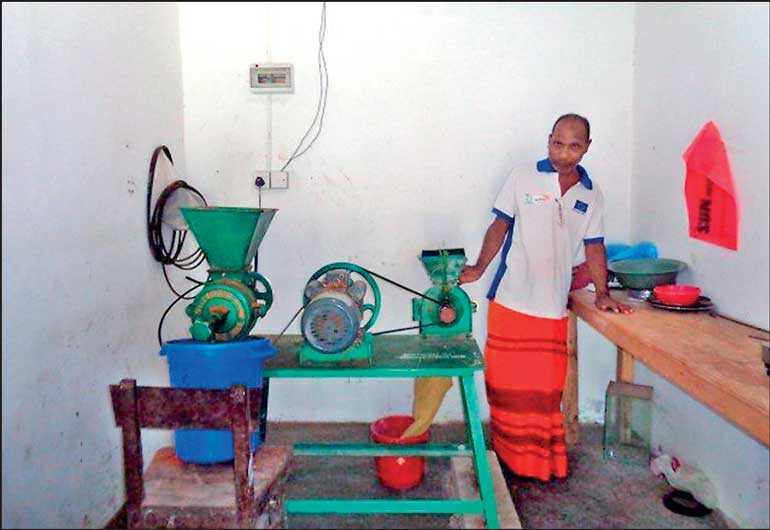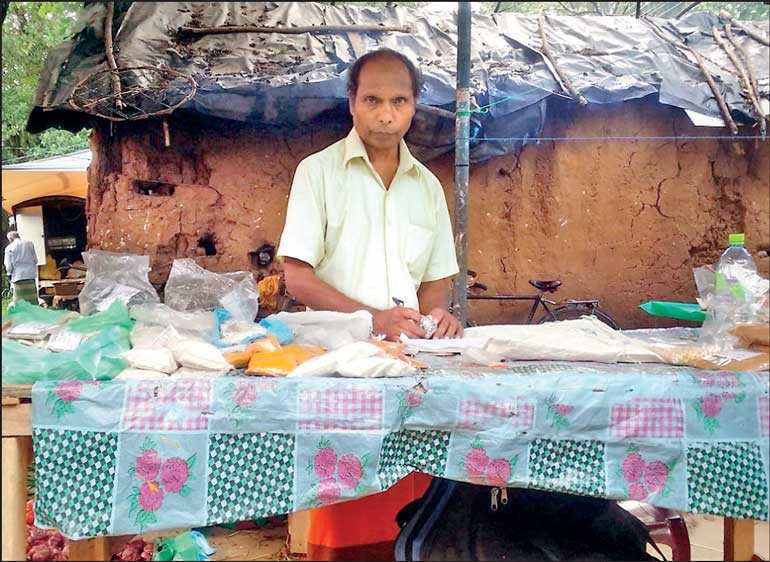Tuesday Feb 17, 2026
Tuesday Feb 17, 2026
Friday, 14 February 2020 00:00 - - {{hitsCtrl.values.hits}}


Muthubanda of Keselpotha in Rideemaliyadda, Badulla, was born with a restrictive disability that slows him in walking and with a difficulty to sit or bend down. He has once run a successful grocery in his town and has saved enough from this primary enterprise to purchase a bus to lease as an additional source of revenue.
However, after a few troublesome years in his entrepreneurship and losing his bus and the grocery, Muthubanda was identified by Project Coordinator Dileepa Gamage, of a project funded by the European Union (EU), ‘Bringing the Community Onboard: Strengthening the role of Civil Society Organisations (CSOs) in increasing the economic resilience of communities’ (BCoB) and implemented by World Vision Deutschland together with their local partners, World Vision Sri Lanka and Janathakshan, as a man determined to fight against his adversities and possessed entrepreneurial skills.
Seizing the EU and World Vision’s support as an opportunity to regain himself, Muthubanda has made a simple request – a multi-grain grinding machine. While he had not used this type of a machine before, it is a true testament to Muthubanda’s understanding of market opportunities and willingness to start afresh that he made this choice. World Vision team has further supported him by providing equipment such as a scale, water pump and bag sealer, which were identified to be essential for his enterprise.
Support for persons with disabilities (PwDs) to access services and resources was identified as a critical need in Badulla District by BCoB project. This project was started in 2016 with the aim of strengthening local CSOs to promote inclusive and sustainable local economic development. Through its implementing partner World Vision, the EU has been able to support PwDs in three villages across Badulla, a district identified both for a high prevalence of PwDs and also for a high rate of poverty.
In Badulla, the World Vision team has assessed the needs and provided assistance to PwDs and care-givers based on skills they possess and their ability to learn. Through supporting selected beneficiaries the EU and World Vision expected to improve their economic wellbeing and integrate them with the wider community. This support has reduced economic and social marginalisation of PwDs.
Over 1.6 million Sri Lankans, or 87 in every 1000, are considered persons with a disability (PwD). This, according to the Department of Census and Statistics, accounts for “any person who as a result of any deficiency in their physical or mental capabilities, whether congenital or not, is unable by themselves to ensure themselves, wholly or partly, the necessities of life”.
Despite challenges such as accessibility and marginalisation over 450,000 of Sri Lankans with disability are also employed or self-employed, and strive as working persons to contribute economically towards their own care and that of society.
The overall aim of this project was to support inclusive development through economic and social integration. Muthubanda’s story illustrates the scope and effectiveness of this work. At the site of his busy storefront, it was evident that this aim was achieved since Muthubanda found his skills recognised by the project and others in his community saw avenues for their own development by collaborating with him.
Muthubanda’s case, among many others who received support through this EU funded project implemented by World Vision, reiterates the importance of enabling access to economic resources and social services for marginalised communities to achieve inclusive development.
The EU has contributed EUR 600,000 for this BCoB project towards strengthening CSO engagement in policy dialogue, development planning and local resource mobilisation, enabling local authorities, CSOs and smallholder farmers to make better and informed economic decisions and improving capacity of CSOs and smallholder farmers to engage with market stakeholders and Local Authorities (LAs) in Badulla district benefitting 45,000 individuals in rural communities through 77 CSOs, and 20 LAs.
It has soon turned out that Muthubanda had correctly identified a market demand and was well-positioned with the new equipment. While spices such as fresh chillie, pepper, turmeric were grown and sold by farmers in Rideemaliyadda, few were making value additions.
After receiving the grinding machine and equipment, Muthubanda has confidently purchased the raw products from farmers, then dried and sifted them of any impurities and ground them into powders for package and sale. Demand for his products has risen overtime. As he once again rose in financial standing, he has set-up a brand new shop that he still runs successfully.
“Now I am earning around Rs. 20,000 a month through this venture. Thanks to the assistance provided by this project funded by the EU me and my family found a new life with my new business,” says Muthubanda.